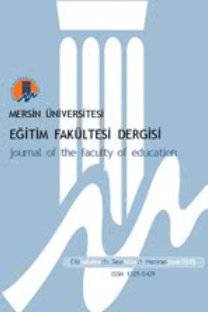A Qualitative Study on 6th Grade Science and Technology Curriculum
Öğretmen görüşleri, fen ve teknoloji öğretim programı, program uygulamaları
___
- Akar, H. (2003). Impact of constructivist learning process on preservice teacher education students’ performance, retention, and attitudes. [Oluşturmacı öğrenme sürecinin hizmet öncesi öğretmen eğitimi öğrencilerinin erişi, kalıcılık ve tutumuna etkisi.] Unpublished doctoral dissertation, Middle East Technical University, Ankara.
- Ayas, A., Cepni, S., Akdeniz, A.R., Ozmen, H., Yigit,N., & Ayvaci, H.N. (2006). In S. Cepni (Ed.) Kuramdan uygulamaya fen ve teknoloji ogretimi (p. 15-20). Pegem-A yayincilik, Ankara:Turkey.
- Bayrak, B., & Erden, A.M. (2007). Fen bilgisi öğretim programının değerlendirilmesi [The evaluation of science curriculum]. Kastamonu Eğitim Dergisi, 15(1) 137-154.
- Brooks, J.G., & Brooks, M.G. (1999). The case for constructivist classrooms. U.S.A.: ASCD.
- Bukova-Güzel, E., & Alkan, H. (2005). Yeniden yapılandırılan ilköğretim program pilot uygulamasının değerlendirilmesi. Kuram ve Uygulamada Eğitim Bilimleri, 5(2),385-420.
- Bulut, M. (2007). Curriculum reform in Turkey: A case of primary school mathematics curriculum. Eurasia Journal of Mathematics, Science and Technology Education, 3(3), 203-212.
- Duffee, L., & Aikenhead, G. (1992). Curriculum change, student evaluation, and teacher practical knowledge. Science Education, 76(5), 493-506.
- Ercan, F., & Akbaba-Altun, S. (2004). İlköğretim fen ve teknoloji dersi 4. ve 5. sınıflar öğretim programlarına ilişkin öğretmen görüşleri. Bildiri Kitabı, Yeni İlköğretim Programlarını Değerlendirme Sempozyumu, Eğitimde Yansımalar-VIII, Kayseri, 311-319.
- Erdoğan, M. (2007). Yeni geliştirilen dördüncü ve beşinci sınıf fen ve teknoloji dersi öğretim programının analizi; nitel bir çalışma [An analysis of a newly developed fourth and fifth grade science and technology course curriculum: A qualitative study]. Türk Eğitim Bilimleri Dergisi, 5(2), 221-254.
- Erdoğan, M. (2005). Yeni geliştirilen beşinci sınıf fen ve teknoloji dersi müfredatı: Pilot uygulama yansımaları. Bildiri Kitabı, Yeni İlköğretim Programlarını Değerlendirme Sempozyumu, Eğitimde Yansımalar-8, Kayseri, 299-310.
- Fraenkel, J.R., & Wallen, N.E. (2003). How to design and evaluate research in education. New York: McGraw-Hill.
- Goodlad, J. I. (1979). Curriculum inquiry: The study of curriculum practice. New York: McGraw- Hill.
- Gömleksiz, M.N., & Dilci, T. (2007). Yeni ilköğretim programının etkililiğine ilişkin ilköğretim müfettişlerinin görüşlerinin değerlendirilmesi. Bildiri Kitabı, 16. Ulusal Eğitim Bilimleri Kongresi, Tokat, Cilt 2, 73-79.
- Gözütok, F.D., Akgün, Ö.E. & Karacaoğlu, Ö.C. (2005). İlköğretim programlarının öğretmen yeterlikleri açısından değerlendirilmesi. Bildiri Kitabı, Yeni İlköğretim Programlarını Değerlendirme Sempozyumu, Eğitimde Yansımalar-8, Kayseri, 17-40.
- Gültekin, M., & Zubukçu, Z. (2008). İlköğretim öğretmenlerinin hizmetiçi eğitime ilişkin görüşleri [Elementary school teachers’ opinions about preservice teacher education]. Sosyal Bilimler Dergisi, 19, 185-201.
- Karatepe, A., Yıldırım, H.İ., Sensoy, Ö., & Yalçın, N. (2004). Fen bilgisi öğretimi amaçlarının gerçekleştirilmesinde mevcut fen bilgisi müfredat programının amaçlar boyutunda uygunluğu konusunda öğretmen görüşleri [Teachers’ views about the appropriateness of the new curriculum for science education’s content in acquiring science education’s aims]. Gazi Üniversitesi Kırşehir Eğitim Fakültesi Dergisi, 5(2), 165-175.
- Kaptan, F. (2005). Fen ve teknoloji dersi öğretim programıyla ilgili değerlendirme. Bildiri Kitabı, Yeni İlköğretim Programlarını Değerlendirme Sempozyumu, Eğitimde Yansımalar-8, Kayseri, 283-298.
- Maxwell, J.A. (1996). Qualitative research design: An interactive approach. Thousand Oaks, CA: Sage
- Metin, D., & Cansüngü-Koray, Ö. (2007). Hizmet içinde görevli öğretmenlerin yeni fen ve teknoloji dersi öretim programı hakkındaki görüşleri: Nitel bir çalışma. Bildiri Kitabı, 16. Ulusal Eğitim Bilimleri Kongresi, Tokat, Cilt 2, 185-192.
- Miles, B.M., & Huberman, A.M. (1994). Qualitative data analysis: An expanded sourcebook (2nd Ed.) Thousand Oaks: Sage.
- MONE-Ministry of National Education [MEB-Milli Eğitim Bakanlığı], (2003). İlköğretim Program Dosyaları. Retrieved November 22, 2007, from http://ttkb.meb.gov.tr/ogretmen/modules.php
- Ornstein, A. C., & Hunkins, F.P. (1998). Curriculum: Foundations, principles, and issues (3rd ed). Boston: Allyn and Bacon.
- Özpolat, A.R., Sezer, F., İşgör, İ.Y., & Sezer, M. (2007). Sınıf öğretmenlerinin yeni ilköğretim programına ilişkin görüşlerinin incelenmesi [The analyse of primary school teachers’ views about the new primary school program]. Milli Eğitim, 174, 206-213.
- Patton, M. Q. (1987). How to use qualitative methods in evaluation. In Newbury Park: CA. Sage.
- Posner, G. J. (1995). Analyzing the curriculum (2nd ed.). The United States of America: Mc Graw- Hill, Inc.
- Richardson, V. (1997). Constructivist teaching and teacher education: Theory and practice. In V. Richardson (Ed.), Constructivist teacher education: Building new understanding. Washington, DC: Falmer Press.
- Şahin, İ., & Özata, E. (2007). Yeni fen ve teknoloji programının kuramsal yapısının, İrlanda, Yeniz Zelanda, Kanada ve New Jersey (ABD) fen eğitimi programlarıyla karşılaştırılması. 16. Ulusal eğitim bilimleri kongresi, Cilt 2, 245- 253, Tokat.
- TSA- Turkish Science Academy [Türkiye Bilimler Akademisi TUBA], (2004). Türkiye Bilimler Akademisi’nin Program ile ilgili Genel Görüş ve Önerileri. Retrieved April 16, 2008, from "http://www.tuba.gov.tr/haber.php?id=147"
- Ünal, S., Coştu, B., & Karataş, F.O. (2004). Türkiye’de fen bilimleri eğitimi alanındaki program geliştirme çalışmalarına genel bir bakış [A general look at the science curriculum development studies in Turkey]. Gazi Üniversitesi Gazi Eğitim Fakültesi Dergisi 24(2), 183-202.
- Van Driel, J.H., Beijaard, D., & Verloop, N. (2001). Professional development and reform in science education: The role of teachers’ practical knowledge. Journal of Research in Science Education, 38(2), 137-158.
- Wilson, S.M., & Berne, J, (1999). Teacher learning and the acquisition of professional knowledge: An examination of research on contemporary professional development. Review of Research in Education, 24, 173-209.
- Yıldırım, A., & Şimşek, H. (2005). Sosyal bilimlerde nitel araştırma yöntemleri. Ankara: Seçkin Yayıncılık.
- Yiğit, N., Akdeniz, A.R., & Kurt, Ş. (2002) Yeni fen bilgisi öğretim programı ile ilgili öğretmenlerin düşünceleri. V. Ulusal fen bilimleri ve matematik eğitimi kongresi, Cilt 1, 400-406, Ankara.
- Yayın Aralığı: 3
- Başlangıç: 2005
- Yayıncı: Mersin Üniversitesi Eğitim Fakültesi
Denizel Fitoplanktonun Ekolojik Önemi ve Küresel İklim Değişikliğindeki Rolü
Altıncı Sınıf Fen ve Teknoloji Öğretim Programları Hakkında Nitel Çalışma -
Genelleştirilmiş Ortalama Fonksiyonu ve Bazı Önemli Eşitsizliklerin Öğretimi Üzerine
Gabil Adilov, Gültekin Tınaztepe, Serap Kemali
İngilizce Öğretmen Adaylarının İnternet Kullanımı Anketinin Geçerlik ve Güvenirlik Çalışmaları
Fulya Cenkseven Önder, Oğuzhan Kırdök
A Qualitative Study on 6th Grade Science and Technology Curriculum
